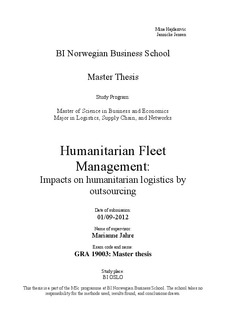| dc.description.abstract | The main purpose of this thesis is to contribute with insights to outsourcing in the humanitarian sector, by focusing on fleet management activities. The theoretical framework showed little research combining outsourcing and fleet literature with humanitarian science. Therefore we aimed to answer the following research question: How can outsourcing of fleet management activities influence humanitarian logistics? To provide an answer to this question we looked at both the demand-side and the supplier-side by introducing three sub-questions. These sub-questions elaborated on the challenges involved in running fleets in the humanitarian sector, the current views on outsourcing from the humanitarian organizations‟ perspective, and the fleet management capabilities of a large logistics service provider that operates on a global scale. The logistics service provider selected was the Norway-based shipping company Wilhelm Wilhelmsen. The research method applied in this study was qualitative and divided into two steps. A cross-sectional research design was used to look at fleet management practices through interviews with ten respondents involved in humanitarian logistics. A case study was applied to look at the resources and capabilities of the logistics service provider Wilhelm Wilhelmsen in terms of fleet management. The case study was also based on interview, as well as conversations and secondary data. We found several challenges involved in running humanitarian fleets, and these constraining factors influence multiple fleet activities, making the overall management complex. We also found that there are good opportunities to outsource some of the fleet activities. However, there is not necessarily an outsourcing rationale lying behind current decisions to source these from external providers. In terms of Wilhelm Wilhelmsen we found that they could be an eligible provider of fleet services, but it would require investments or collaboration with existing providers. The main findings indicate that outsourcing is a strategy that has the potential of improving fleet management in the humanitarian sector, thus improving humanitarian logistics. | no_NO |
